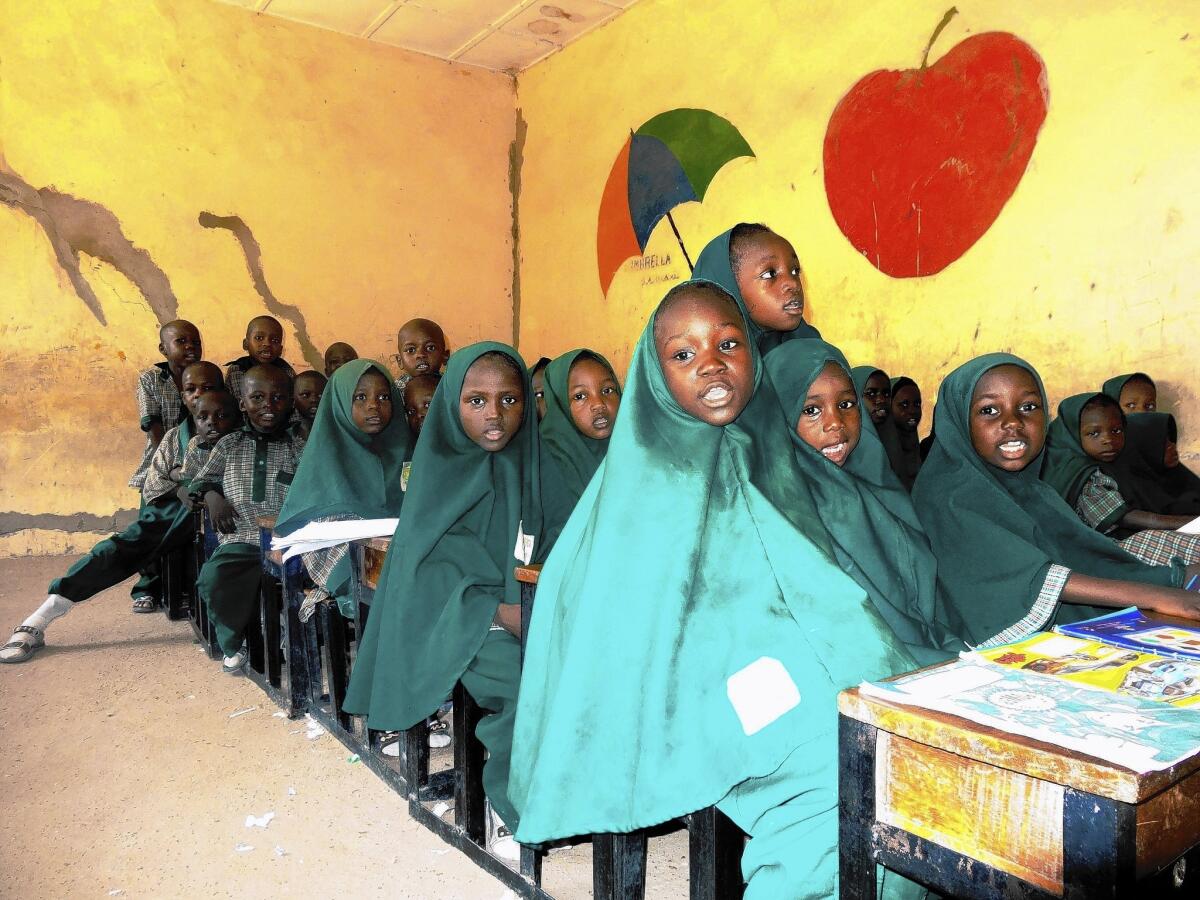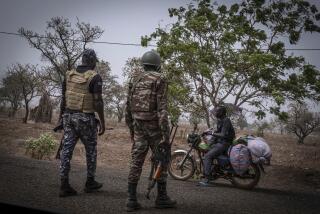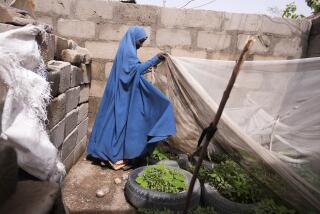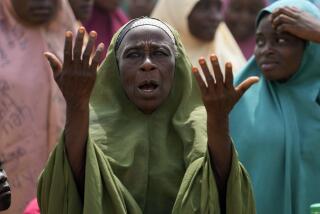In Nigeria, child beggars are easy recruits for Boko Haram extremists

Reporting from Kano, Nigeria — They scurry between vehicles in the traffic-choked cities of northern Nigeria, small boys in tattered clothing armed with begging tins.
Known as the almajiri, the youngsters, some no older than 5, have flooded the streets for the nearly 15 years since a tsunami of cheap Chinese imports and a dysfunctional electrical system began destroying the region’s once-thriving textile manufacturing industry. Many more children have streamed in from rural areas since similar collapses of the fishing and agriculture sectors left their parents unable to feed them.
Here, the youngsters’ only schooling comes from threadbare clerics for whom they recite the Koran a few hours a day. And then they go out and beg for food. Such conditions have made the almajiri prime fodder for recruitment by Boko Haram.
“These are ... vulnerable children,” said human rights activist Shehu Sani, an expert on the violent Islamist group that emerged in 2002. “They have in many cases turned to extremism and crime because they were sent away by their parents at a very tender age and they grow up under the care of teachers who use them.”
Among the almajiri, said Sani, was Abubakar Shekau, current leader of Boko Haram, which initially mushroomed by offering a religious path that condemned what it called the corruption and decadence of Nigeria’s Western-educated elite. After its founder, Mohammed Yusuf, was killed in 2009, the group, led by Shekau, became increasingly violent, slaughtering non-Muslim schoolboys, kidnapping hundreds of rural schoolgirls and shooting down villagers by the dozen with AK-47 assault rifles.
“There’s a very strong correlation between poverty, unemployment, illiteracy and the issue of the insurgency and insecurity,” said Britain-educated Kano Gov. Rabiu Musa Kwankwaso. “A very poor man who is looking for something to eat can easily be recruited by the insurgents, and so can the unemployed and illiterate, and that’s exactly what is happening.”
::
Three decades ago, northern Nigeria’s largest cities were manufacturing meccas. When factory workers spilled onto the streets at shift changes, they formed a sea of people flowing homeward in colorful garb. Textiles, leather, furniture, plastics and food factories employed 100,000 people in Kano alone, according to a 1996 U.N. study.
But after Nigeria joined the World Trade Organization in 1995, removing tariffs and quotas that had protected the textile and food industries, cheap Chinese goods became available in quantity. Kano’s factories started closing around 2000.
Meanwhile, Lake Chad and its fishing catch began to shrink, caused by overuse and climate change.
The joint collapses have left a generation with limited ways to scrape by: washing cars; hawking candies, beads, water and fruit; pan-handling; or stealing. The entire Muslim-dominated northern region has suffered, including Maiduguri, the birthplace of Boko Haram and a trade center dependent on Kano.
With an aversion in the north to secular education, associated with British colonialists and later with a corrupt, Western-educated elite, youngsters have been further enticed by militant clerics to Boko Haram (which translates to “Western education is a sin”).
Only 28% of children in the northern state of Borno attend school, according to Nigerian government statistics, and the literacy rate in the north is 32% compared with the 68% national average. Nigeria’s poverty rate grew from 55% in 2004 to 61% in 2010, largely because of the collapse of the northern economy.
Panhandling was recently banned in Kano in an attempt to reduce the sea of almajiri on the streets. Yet they remain visible, hollow-cheeked, anxious, their hands extended.
::
Shamsu Dahiru, 22, who was raised to beg and pray among the almajiri, is among the vulnerable, illiterate and trapped in poverty. As a small boy, he was removed from primary school by his father and sent for a rudimentary Islamic education from a cleric.
“He wanted me to learn the Koran. He preferred an Islamic education. Only God knows why. I feel bad. I haven’t had a modern education and opportunities like other people,” said Dahiru, who sees no prospect for improving his situation.
Dahiru began working at 10 as a bicycle repairman and car washer. Recently, the skinny young man was accused of pulling fabric from a bundle on a porter’s back. Seized and chained, the metal links biting into his ankles, he waited with anxious eyes outside the Kantin Kwari Market Traders Assn. headquarters to learn his fate.
He denied stealing and begged for mercy. But to traders, young men like him are at the root of all the city’s problems.
Liti Kulkul, chairman of the traders group, says the rise of Boko Haram grew out of the region’s economic crisis.
“Of course the major cause of the insecurity is the closure of our industries, which led to massive unemployment,” he said.
In the Adhama textile factory, a hulking 30-year-old textile machine stands coated in dust. Upstairs, where hundreds of machinists once sewed, all is silent, with two idle workers silhouetted at the far end of a vast room.
The Adhama family textiles factory employed 347 people in 2000, but has let all but 30 go. The workers used to weave pure Nigerian cotton fabrics, but now make a polyester blend that cannot compete with Chinese fabrics.
“In my factory it costs $1 to make a T-shirt,” said Nasir Adhama, the oldest son in the business. “But the Chinese make a dozen for a dollar, so how can I compete with them? In 24 hours we only get two hours’ electricity so we work for 22 hours on generator, with the cost of diesel fuel.”
Family patriarch Saidu Adhama says $4 billion worth of Chinese goods were sold in Kano during a six-month period last year.
“This market is meant for the Nigerian textile industry, tailors and farmers,” he said, calling for renewed protection for local manufacturers.
In 2010, in an attempt to revive the northern Nigerian manufacturing industry, the national government established a $625,000 fund to revive shuttered factories. But the effort failed, said Mohammed Abubakar, head of the Nigerian Chamber of Commerce.
“If you give me money to buy machines and raw materials and you don’t give me an equal opportunity in the market, then where is the help?” the senior Adhama said to the Vanguard newspaper in March.
::
In 2009, Nigeria unsuccessfully pushed for an ambitious transnational plan to pump water from the Congo basin to Lake Chad.
Random insurgent attacks — including the beheading of truck drivers transporting sorghum and millet to market, have led to further instability. Abductions and killings of foreigners have scared away investment.
Northern state governors have taken steps to counter Boko Haram. Borno Gov. Kashim Shettima last year offered to pay parents to send their children to school, only to later close schools because of Boko Haram’s attacks.
In addition to the begging ban, Kano officials have made street lighting improvements and outlawed motorcycle taxis, which militants sometime use for drive-by assassinations. Even so, Kano has experienced repeated bomb attacks in the last few months.
Something still needs to be done to improve the lives of the young unemployed, said Gov. Kwankwaso.
“I believe we need a Marshall Plan, to support them, seriously, while the government is dealing with the insurgency itself.
“Time is running out,” he emphasized, “especially in the northeast.”
More to Read
Sign up for Essential California
The most important California stories and recommendations in your inbox every morning.
You may occasionally receive promotional content from the Los Angeles Times.










